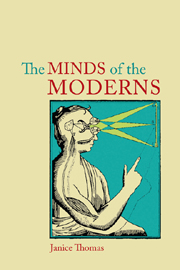Book contents
- Frontmatter
- Contents
- Acknowledgements
- Abbreviations
- Introduction
- I Descartes
- II Spinoza
- 6 Is the mind a substance for Spinoza?
- 7 Spinoza and self-knowledge
- 8 The subject of thought and consciousness
- 9 Spinoza and mental causation
- 10 Spinoza on representation
- III Leibniz
- IV Locke
- V Berkeley
- VI Hume
- Conclusion
- Bibliography
- Index
7 - Spinoza and self-knowledge
from II - Spinoza
- Frontmatter
- Contents
- Acknowledgements
- Abbreviations
- Introduction
- I Descartes
- II Spinoza
- 6 Is the mind a substance for Spinoza?
- 7 Spinoza and self-knowledge
- 8 The subject of thought and consciousness
- 9 Spinoza and mental causation
- 10 Spinoza on representation
- III Leibniz
- IV Locke
- V Berkeley
- VI Hume
- Conclusion
- Bibliography
- Index
Summary
Spinoza is convinced that it is only by seeking and obtaining as much understanding as we can of our passions and emotions, beliefs, intentions and wants, and so on, that we can have any hope of balancing or subduing them in order to achieve happiness and whatever salvation is possible. And we can know that this individual personal self-knowledge is a worthy, and to some extent attainable, object of our efforts by coming to know the shared fundamental nature of human minds and their place in reality as a whole.
However, Spinoza also thinks that there are severe limits on individual human self-knowledge. Knowledge of my own body is said to be very limited, and what there is is necessarily indirect. Worse still, knowledge of my own mind is said to be, to a great extent and unavoidably, inadequate and confused. And although Spinoza is sharply critical of Descartes for not providing us with a clear and distinct conception of the union of mind and body (E5 Preface), it is difficult to find in Spinoza's own writings a credible attempt to furnish such an account. So it is equally difficult to see how Spinoza could hold that individual persons can have self-knowledge of the mind and body union that we all take ourselves to be.
Yet Spinoza's metaphysical system has often been seen as committed to the principle that individual thought can match reality, that there are ideas adequate to every object, that reality is through and through intelligible and thus that our knowledge of reality cannot fall prey to wholesale and inescapable epistemological scepticism.
- Type
- Chapter
- Information
- The Minds of the ModernsRationalism, Empiricism and Philosophy of Mind, pp. 70 - 79Publisher: Acumen PublishingPrint publication year: 2009

